A Quote by Claude Levi-Strauss
Nor must we forget that in science there are no final truths.
Related Quotes
The purpose of scientific method is to select a single truth from among many hypothetical truths. That, more than anything else, is what science is all about. But historically science has done exactly the opposite. Through multiplication upon multiplication of facts, information, theories and hypotheses, it is science itself that is leading mankind from single absolute truths to multiple indeterminate, relative ones.
We must not forget that when radium was discovered no one knew that it would prove useful in hospitals. The work was one of pure science. And this is a proof that scientific work must not be considered from the point of view of the direct usefulness of it. It must be done for itself, for the beauty of science, and then there is always the chance that a scientific discovery may become like the radium a benefit for humanity.
He [the writer] must, teach himself that the basest of all things is to be afraid; and, teaching himself that, forget it forever, leaving no room in his workshop for anything but the old verities and truths of the heart, the old universal truths lacking which any story is ephemeral and doomed - love and honor and pity and compassion and sacrifice. See Poets & Writers
Lest we forget, the birth of modern physics and cosmology was achieved by Galileo, Kepler and Newton breaking free not from the close confining prison of faith (all three were believing Christians, of one sort or another) but from the enormous burden of the millennial authority of Aristotelian science. The scientific revolution of the sixteenth and seventeenth centuries was not a revival of Hellenistic science but its final defeat.





































